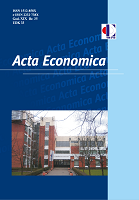KNOWLEDGE MANAGEMENT AND DOWNSIZING: IMPLICATIONS FOR ORGANIZATIONAL PERFORMANCE
KNOWLEDGE MANAGEMENT AND DOWNSIZING: IMPLICATIONS FOR ORGANIZATIONAL PERFORMANCE
Author(s): Marko Slavković, Marijana Bugarčić, Jasmina OgnjanovićSubject(s): Business Economy / Management, Labor relations, Health and medicine and law
Published by: Економски факултет Универзитета у Бањој Луци
Keywords: knowledge management; downsizing strategy; organizational performances; economic crisis; downsizing; pandemic covid-19;
Summary/Abstract: Downsizing as a corporate restructuring strategy aims to reduce significantly the number of employees in order for the company to adjust to the reduction of revenues resulting from the influence of environmental factors. Workforce reduction is most often implemented during economic crises, which is why it is associated with ambivalent outcomes. Reducing the number of employees through reducing the budget for salaries can have a favorable impact on reducing costs and thus enable the company to operate in the short term. The departure of employees from the organization is associated with a potential loss of organizational knowledge that can reduce the company’s competitiveness and have a negative impact on business. The purpose of this paper is to identify the impact of workforce reduction on knowledge management and organizational performance. A questionnaire filled out by managers from 75 companies was used to collect data. Correlation analysis and multiple hierarchical regression were applied to determine the relationship between the observed variables. The results showed that downsizing has a statistically significant and negative impact on organizational performance. Knowledge management has a positive impact on organizational performance and reduces the negative impact of workforce reduction on organizational performance during the implementation of downsizing. The obtained results give clear practical guidelines to managers that downsizing can have negative consequences on organizational performance if the protection of organizational knowledge is not taken into account and that managers must focus on knowledge in order to preserve potential for competitiveness and performance. The obtained results have a much broader significance in all those situations (restructuring, digitalization, business model change, etc.) in which the company needs to reduce the number of employees.
Journal: Acta Economica
- Issue Year: 19/2021
- Issue No: 35
- Page Range: 35-51
- Page Count: 17
- Language: English

